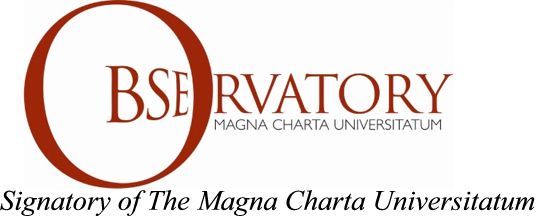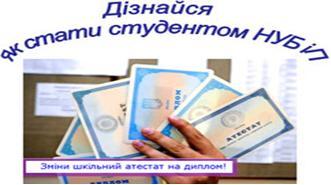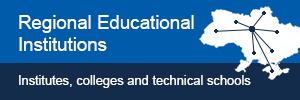Department of foreign philology and translation: we work remotely, teaching students and studying ourselves
The quarantine period became an opportunity not only for the organization of distance learning of students, but also for gaining new experience by instructors of the department of foreign philology and translation, because it turned out that there are many opportunities for distance learning with students.
First of all, it is a common e-learn platform for many teachers. Its possibilities are quite wide – from lectures to practical classes and independent work. In particular, the head of the department Amelina S.M. during the first week of the quarantine period, covered with the 3rd year students of specialty 035 "Philology" lecture material on "Semantische Derivation (Bedeutungswandel)" in the discipline "Comparative lexicology of major foreign (German) and Ukrainian languages". The next step is to check the practical task.

In addition, within the course, students were provided with materials for writing coursework, including a sample design. A Viber group has been set up to provide two-way, third-year and two-year students with a two-way experience.
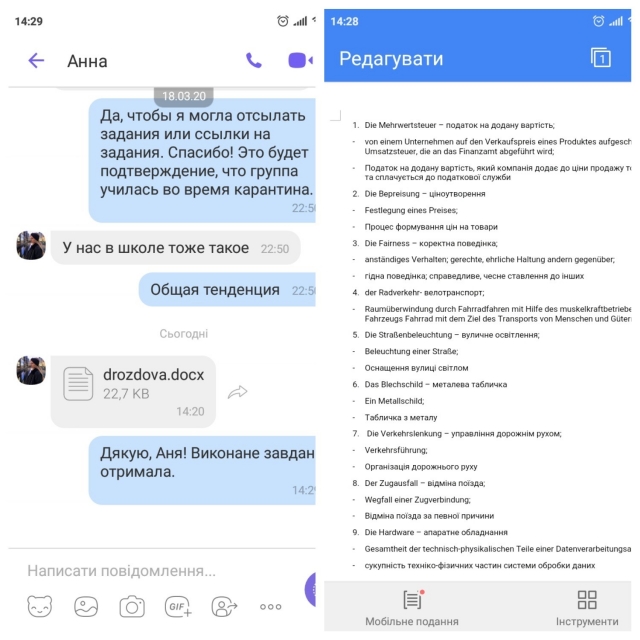
Associate professor Bilous N.V. not only actively applies familiar channels of collaboration, but also video communication with students to develop oral language skills in German. This allows them to listen to a task and correct mistakes.
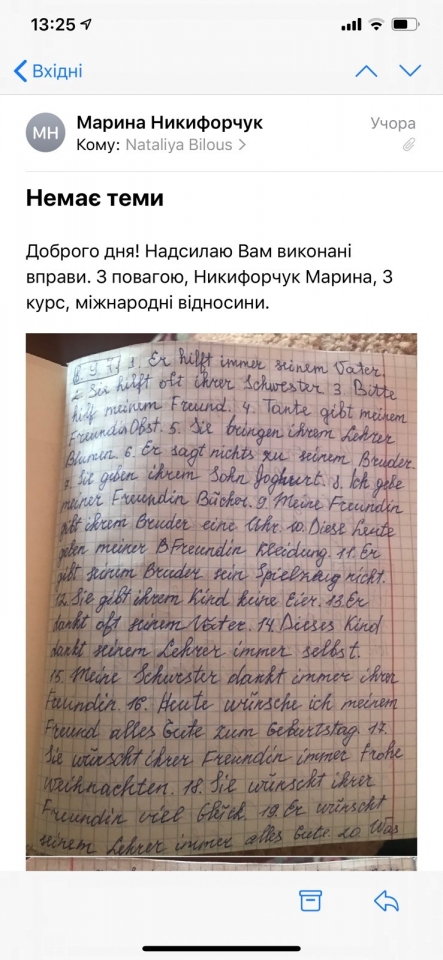
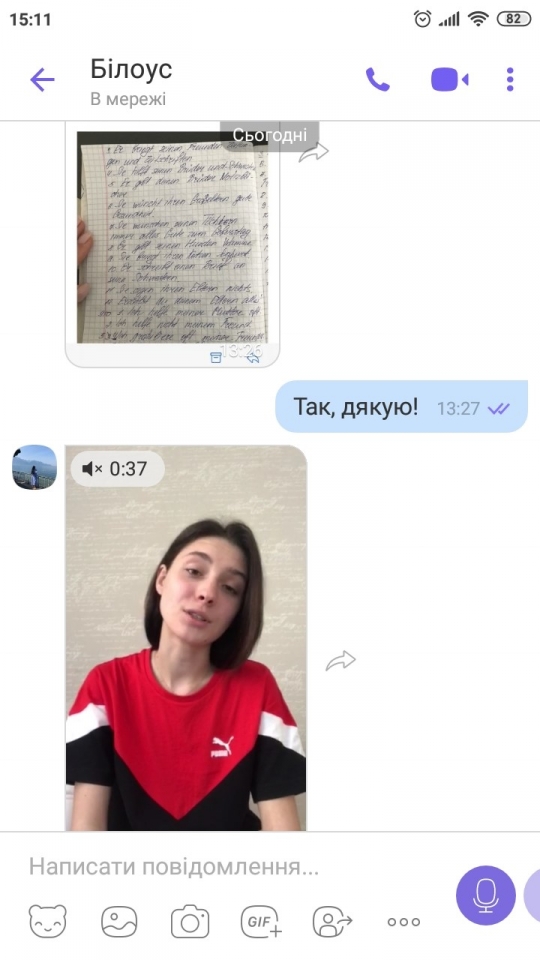
Associate professor Zakhutska O.V. works on the e-learn platform with students-philologists studying the subjects "Polish language" and "Practical course of the second foreign language (Polish)", on textbooks and using other platforms on the Internet. But given the large volume of files, first-year students send the completed tasks mostly to e-mail. The second year students work in the Telegram group and the third year students in the Viber group.

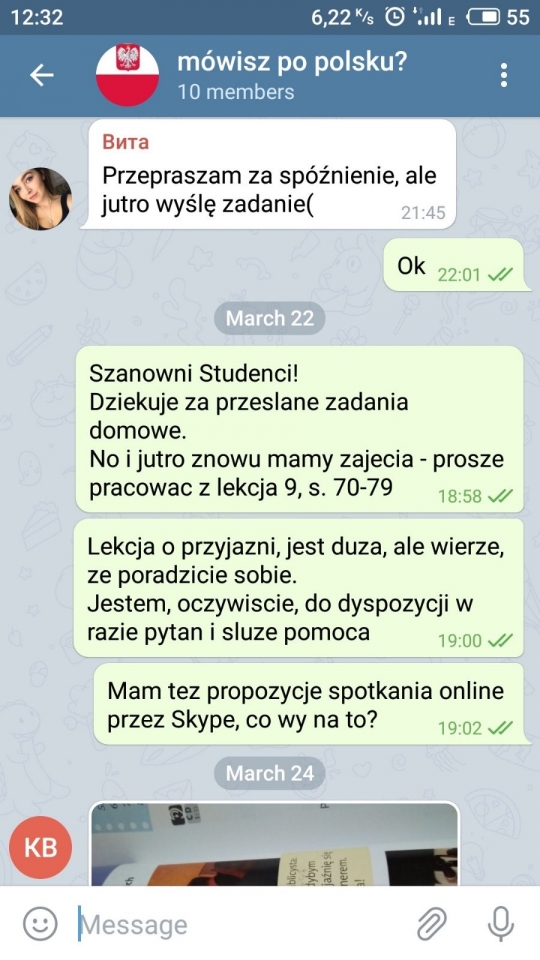
If the students' homework is not very large in scope, then it is quite possible to test them on the e-learn platform, as is done by assistant M.S. Skokova on the discipline "Linguistic studies of the languages (German)".

Associate professor Olkhovska N.S. distributed work among students in such a way that part of it is carried out on the e-learn platform (for example, in the discipline "Practice of written and oral translation"), and some of the completed tasks students send to an e-mail box.
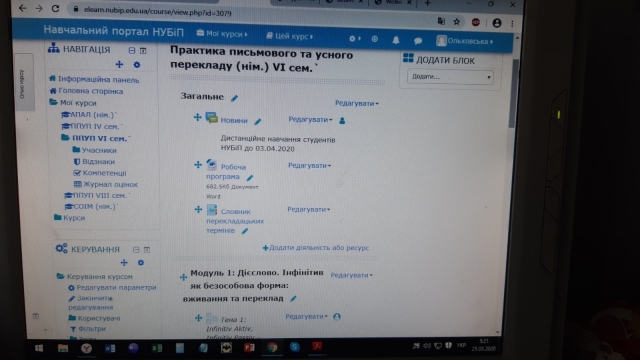
Associate professor V.V. Strilets focus mainly in distance learning of students both of specialty 035 "Philology" (subjects "Practical course of the basic language (English)", "Practical course of the second language (English)", and other specialties that study English, focusing on the materials of the relevant courses on the e-learn platform.

Associate professor Pylypenko O.P. actively uses authentic sources available through the Internet during distance learning and, of course, checks the results of the tasks. Judging from the grades and comments, the third year students conscientiously take this form of study and complete the task in a timely and correct manner, because the discipline "Practical course in the basic foreign language (German)" is extremely important for their future professional activity.
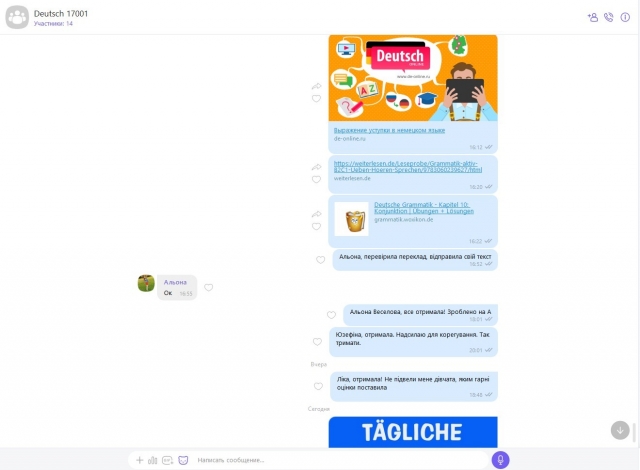
Associate professor Zuenko N.O. organized distance learning in German for e-learn platform students in “Tourism” specialty, complementing it with the group work in Telegram and Viber.
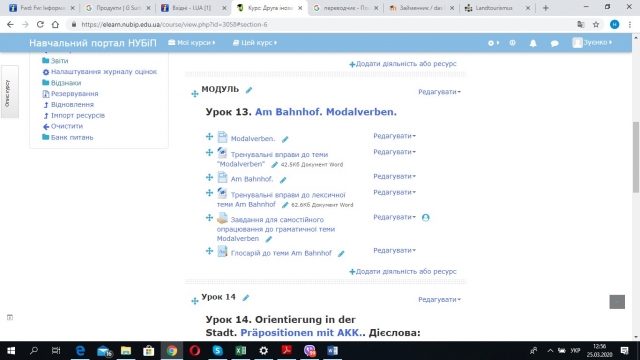
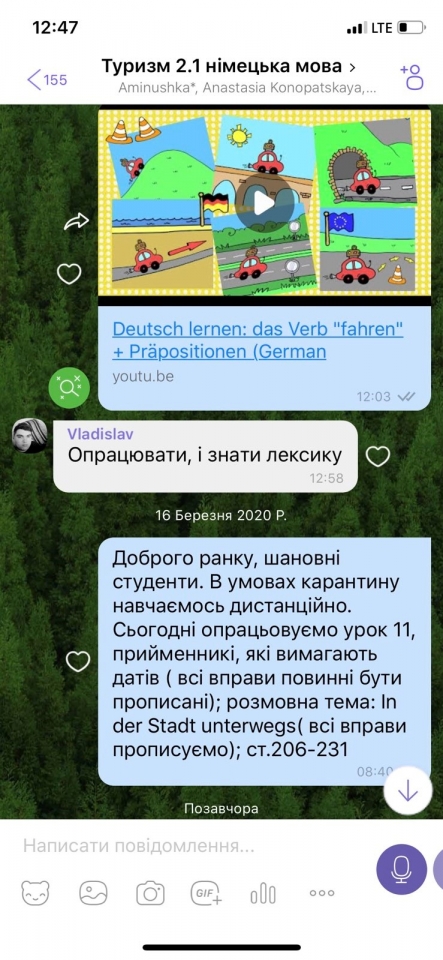
Associate professor Monashnenko A.M. also uses various forms of student education - courses created on the e-learn platform and initial communication in the Viber group, which allows to respond promptly to students' appeals and provide them with the help they need.
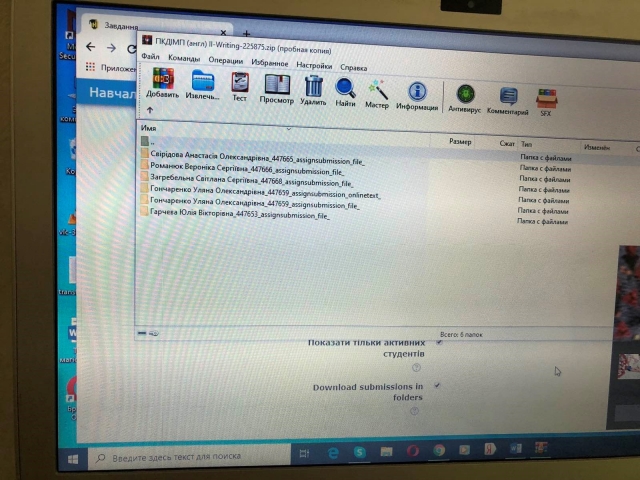
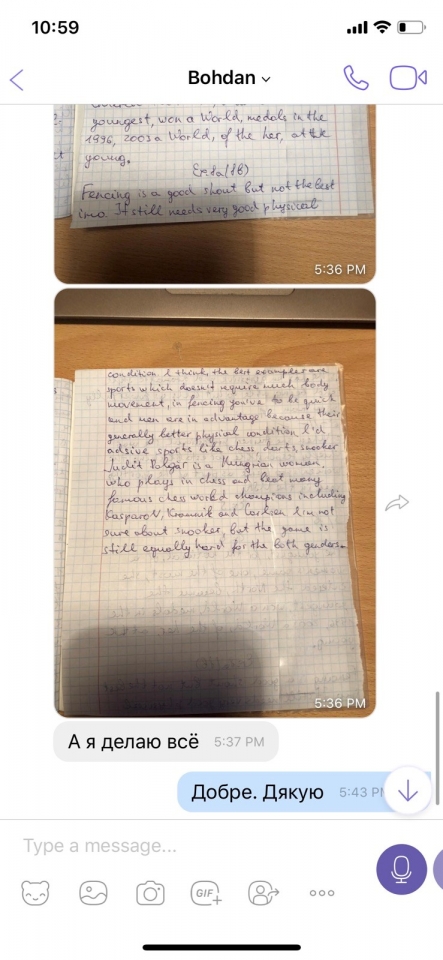
Associate professor Kolodina L.S. teaches the Polish language course at the e-learn information portal, which brings together 190 students from various disciplines of the humanities and pedagogical faculty who study Polish this semester.


The senior instructor Kononchuk I.V., apart from the traditional means of distance learning, has already started to use successfully the new ones, which she got acquainted with during quarantine.
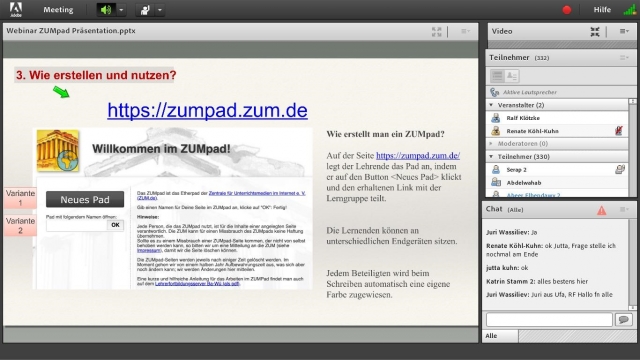
Senior instructor Moskalenko S.A. notes the particular activity of first-year students in the Telegram group. By getting references to authentic resources, which is especially important for learning a major foreign language – German – by future translators, they are quite punctual in fulfilling their tasks.
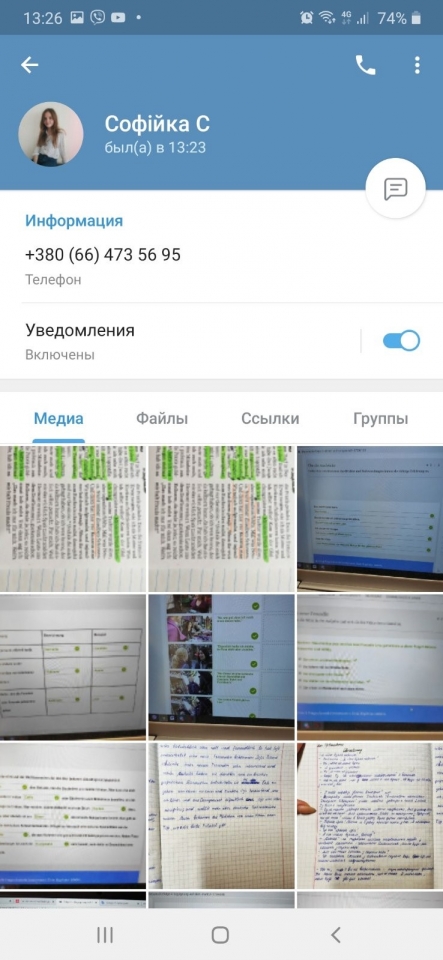

Senior instructor Rudnytska N.A. uses a variety of authentic resources, including educational videos, to diversify French language learning.

Senior instructor Kolesnyk M.Yu. uses the e-learn platform for teaching the discipline of scientific and technical translation, and for the groups learning German – groups in Telegram, Viber and online sources.


Associate professor Fomina H.V. actively works, in particular, with the students of the specialty "International relations" who study German using authentic sources of educational materials from the Internet.


Associate professors Artyomtsev O.V. and Maksymchuk V.S., senior instructor Piven O.B. pay more attention to individual work with students, so they receive completed assignments from their e-mail accounts.
Summarizing the previous discussion (also remote!) of the teaching experience, we can conclude that the effective tools are the e-learn platform, Telegram and Viber groups.
At the same time, instructors of the department of foreign philology and translation do not miss the opportunity to try new forms of distance learning. In particular, the suggestion that access to the WebEx (Cisco) platform was already used by associate professor Kolodina L.S. and senior instructor Kononchuk I.V.
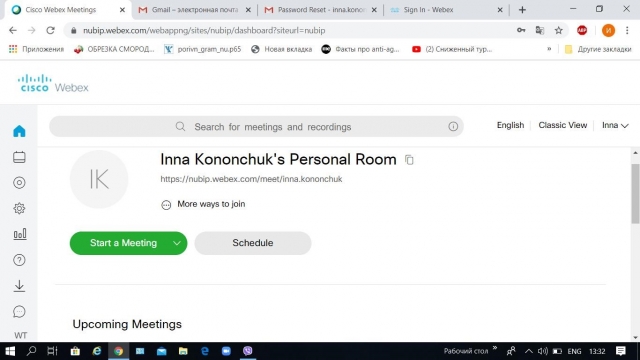
So, we follow the rules of quarantine and work remotely, teaching students and studying ourselves!
Svitlana Amelina,
head of the department of foreign philology and translation



